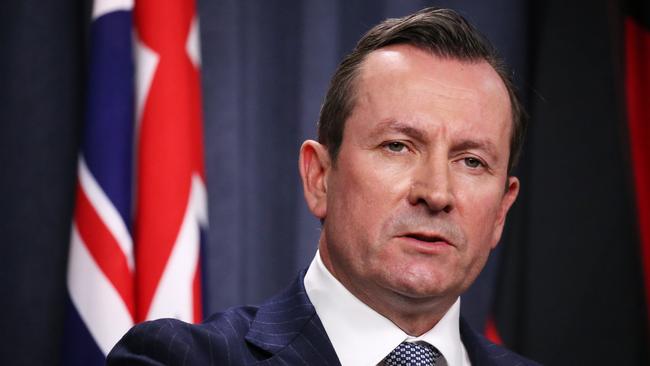Coronavirus: WA says COVID risk ‘low’ but hard border valid
The WA government insists its hard border closure is ‘necessary’ for protecting its citizens.

The Western Australian government has conceded the probability of COVID-19 entering the state from Queensland, South Australia, Tasmania and the territories is “low” or “very low”, but insists its hard border closure is “necessary” for protecting its citizens.
In its submission to the High Court, which will hear Clive Palmer’s challenge against the constitutionality of the WA border on November 3, the state government also warned of coronavirus cases arriving from “border hopping” travellers.
The ACT, for example, was “more vulnerable to transmission from people entering from NSW” and so a person from Canberra – where there has been no community transmission for months despite ongoing cases in Sydney – posed a “real, and not fanciful, risk”.
Mr Palmer, who is unable to travel to WA for work, believes the state’s hard border is invalid under section 92 of the constitution, which says movement among the states “shall be absolutely free”.
The WA government, backed by the state police commissioner Chris Dawson, said Mr Palmer should pay the costs of the special case.
Because the border only prevented interstate movement for two-week periods at a time, was temporary and for a particular health reason, the WA government argued it was valid.
WA Premier Mark McGowan has failed to nominate a date to open the border to any other jurisdiction. The state and federal budgets last week assumed that would not occur until April.
“The court should find that the directions are reasonably necessary for the purpose of protecting the Western Australian population against the health risks of COVID-19, and that the directions are suitable, reasonable necessary for, and adequate in achieving the balance for that purpose or object,” the submission states.
“As well the court should find that there are no other equally effective means available to achieve that purpose or object which impose a lesser burden on interstate intercourse (movement).”
Based on a model of probability of importation of COVID-19 into WA, the state government said coronavirus coming in from other parts of Australia overall was “likely moderate”.
Importation from Victoria was “likely moderate” and NSW “moderate” – jurisdictions with at least one reported case of community transmission within the previous 28 days – while importation from Queensland, SA, the ACT and the Northern Territory was “low” as there had been no reported community transmission in that time.
The risk of importation from Tasmania was “very low” because there had been no community transmission for 28 days and the island state’s border was closed to “mitigate the risk of border hopping”.
Attorney-General Christian Porter, who had decided to intervene in the case against WA’s border but withdrew, said it was “honestly hard to say” if the measure was primarily about people’s health.
“There are obviously comments from the Premier last week about the fact that he takes the view that there’s economic advantage in keeping people in WA and preventing them from going interstate and spending their money anywhere else other than in Western Australia,” Mr Porter told 6PR radio.
“I don’t think that can ever be a valid reason for keeping hard borders up because the human side of having hard borders is ... that you don’t get people able to visit their families or travel for healthcare.
“For 120 years in Australia, we have structured every part of Australian life, our families, our healthcare, our businesses, everything around a fundamental right that we all have as Australians to leave our home state and come back without threat of sanctions from our state government. Now, there will be from time-to-time reasons to limit that right, but they have to be based in health and they have to be based in evidence.”




To join the conversation, please log in. Don't have an account? Register
Join the conversation, you are commenting as Logout